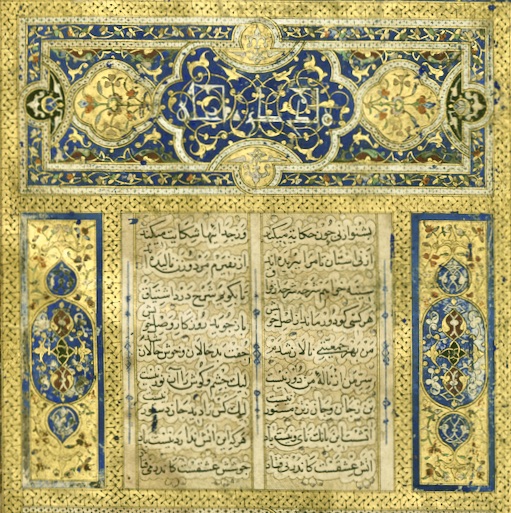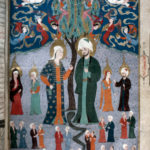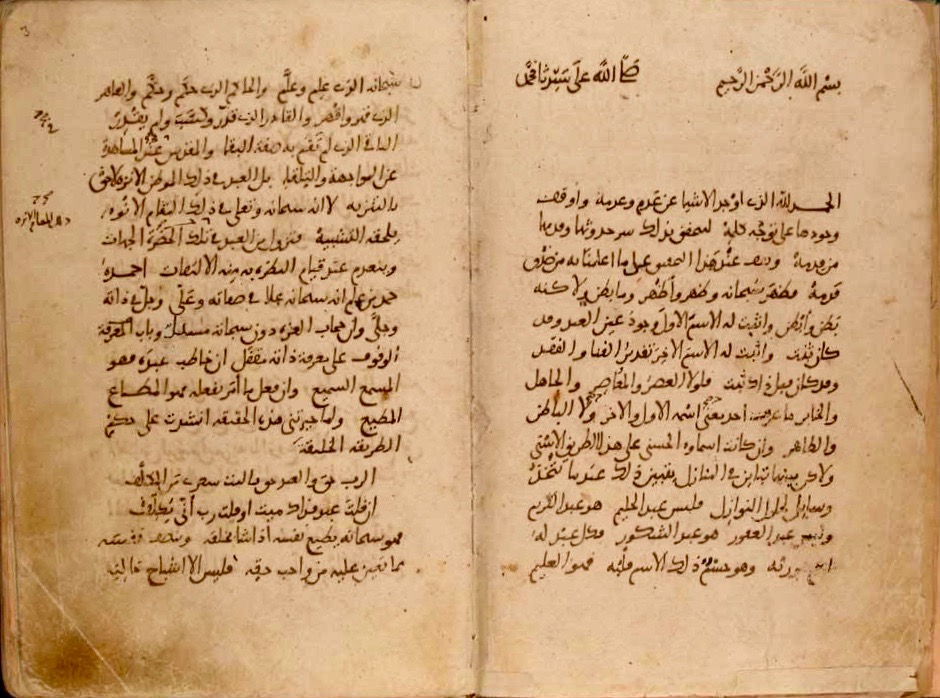
Man as the 'caliph’ of God is the light of God in the world. If man disappears as the caliph the light of God is hidden and the world becomes enveloped in darkness. The humane in religion is a ‘humanism of faith’, a concept of religion where the humanity of man is not taken away. Faith in a theistic humanity is faith that is always associated with freedom, for it is in faith that freedom lies. [1]
THE CONNECTION WITH GOD in this humanity of faith is a living and awakened relationship, not one that is based on submission, enslavement, or trampling upon dignity. It is based on freedoms and rights. The relationship with God in building a spiritual and moral life can only take place if it is based on freedom and choice, not on coercion, intimidation, enslavement and humiliation. Defending God in this humanity of faith begins with defending human dignity, in safeguarding one’s rights, and protecting one’s freedoms. This is because the path to God only leads through respect, consideration and honour for mankind. This ‘humanity of faith” is not completely synonymous with the term humanism that has emerged in the modern era, although it intersects with it in its most important aspects, such as emphasizing the recourse to reason, rehabilitating literature, the arts, the sciences and human knowledge, and its major task in building and developing life, in respecting human dignity and protecting freedoms and rights.
The term ‘humanism’ originated in the modern era as a reaction to the Church’s monopoly of science and knowledge, its rejection of reason, its role in regulating how one viewed nature and the world, and its negative attitude towards employing the accumulated experience of mankind in various fields of life. This impelled some western writers and thinkers in the sixteenth and seventeenth centuries to revisit the languages of the ancient world and benefit from excavating the literature and cultures of those societies. In doing so it broke the monopoly of the Church and its position of refusing recognition of all the sciences and knowledge produced by man outside the framework of religious texts.
Religion does not represent a stage in the development of human consciousness, because it existed with the first man and will remain until the last. We need to work with reason and adopt it as a reference for everything, to use it in interpreting the various religious and worldly phenomena. It must be used to test every issue in the faith, regardless of whether it supports or denies it. We must place our trust in the mind for understanding religion and use it to draw a map of the arena it is to occupy in life and by which it can fulfil what it promises. We must use it to determine the impact of active faith in building a spiritual life, in enriching moral responsibility, in awakening the mind and consolidating the will. The reasoning mind will reveal that when religion goes beyond its bounds it not only loses its constructive function, but becomes a tool for disrupting the mind, for drowning the life of the individual and society in problems that constantly generate countless more problems.
Mankind was able to renew the way he understood religion, and renew the tools for interpreting his texts, and there is great importance for employing these methods and tools in religious studies today. We need to adhere to critical thinking in order to test the value of every idea, whether it relates to understanding religion and interpreting its texts or otherwise, and in order to distinguish what is real from what is false. Criticism is a means for differing and not merely for imitating – a scientific criticism of ideas is actually a celebration and an honouring of the author of those ideas. Criticism is a necessity for any renewal of the life of faith and for the enrichment of its vital presence in the spiritual, moral and aesthetic life. It is the only tool of the mind for correcting and maturing ideas. Uncritical religious thought is soon out of circulation and forgotten.
When we call for saving humaneness in the religion we mean building an alternative understanding of the faith, a enlightening interpretation that understands the religious texts in step with the world as it is. Such an interpretation that can only be evinced by breaking out of the closed system of Salafist thought, and by employing the methodologies, tools and facts yielded by modern sciences and the humanities. This type of interpretation does not reduce religion to theology and jurisprudence, nor does it extract it from its spiritual, moral and aesthetic fields into a field where law prevails over values. Religion is not turned into a polemic ideology, one that dissipate any spiritual, moral or aesthetic religious meaning. This interpretation instead seeks to discover the inherent function of faith for producing meaning in the life of man. It is a function that most religious groups today have failed to comprehend, by plunging themselves and their societies into conflict where everything but morality and the values of compassion, love, peace and tranquillity are in evidence.
I would like to point out here briefly that I am against all forms of idolization of beliefs, ideas and persons, whatever they may be, whether carried out by Sufis or others. Every idea derives its value from how it expresses truth, and everyone derives their status from how they adhere to the truth and favour mankind by defending his dignity, rights, freedoms and just cause. Most Sufis were engaged in idolising their elders and numinaries, and their murīdīn aspirants continued to imprison themselves in some voluntary slavery to their shaykhs, whose teachings became elevated to sacred status to which the murīdīn had to acquiesce to the point of enslavement, shackling them and paralyzing them.
Yet, at the same time, one finds traces of their cognitive mysticism enriched by what is scarcely found in the influence of theology. Such a type of Sufism rebuilt the connection with God by making speaking the language of love and joy at conjoining with a beauteous beloved One. Its writings overflow with terms of mercy, compassion, kindness and solidarity with the poor and the afflicted. Some Sufis raised these terms to a central goal of faith religion as they saw it. What is more, scholars of this cognitive mysticism did not reject reason, but rather adopted it and held to its proofs for building their cognitive system and drawing their vision of the world. This is what we find in the works of Muḥyī al-Dīn Ibn ‘Arabī [2]and other thinkers who fashioned an intellectual to defend their position and refute the arguments of their opponents.

Suggested Reading
The influence of some of the stars of Sufism, such as Jalāl al-Dīn Rūmī,[3] also prioritised reverence for divine love, for an optimistic view of life, the celebration of art, for demonstrating the beauty of existence, for calling to joy, and for making love the prime material of the faith. Purifying the heart of all hatred became the key to human purity, as Jalāl al-Dīn Rūmī stipulated by saying:
Perform wuḍū’ with love before you do it with water, for it is not allowed to pray with a spiteful heart.
Some were able to formulate a series of concepts that liberated man from his existential alienation, and guided him towards teachings that encouraged him to come to terms with the world in which he was living. In these works we find an understanding of religion and an interpretation of texts that dealt with those who differed as human beings, regardless of whatever belief they held. Most works of Sufism are devoid of the negative judgments about those who differed in faith that we find in other trends. None of their prominent exponents evinced concepts that instilled hatred of other religions, of which forbade dealings with their adherents or perpetuated any aversion towards them. Some of them were unique for their statements that broke the monopoly to divine mercy, which instead expanded the circle of those who are saved, and which formulated an understanding of salvation in the Afterlife that did not make it the exclusive right of those who held a particular belief.
[1] This essay is on the author’s work إنقاذ النزعة الإنسانية في الدين ‘Rescuing the Humane in Religion’, which is now published in a revised fourth edition as الدين والنزعة الإنسانية ‘Religion and Humanism’, published by Dar Al-Rafidain and the Center for the Study of the Philosophy of Religion.
[2] Muḥyī al-Dīn Ibn ‘Arabī (1165–1240 AD) was an Andalusian scholar, mystic, poet and philosopher born in Seville, and is known for being the first person to explicitly delineate the concept of waḥdat al-wujūd (‘the Unity of Being’), a monist doctrine which claimed that all things in the universe are manifestations of a singular ‘reality’. In developing the doctrine of al-Insān al-Kāmil (‘the perfect man’) as Muḥammad, Ibn Arabi extended it to denote an individual who binds himself with the Divine and with all creation, and applied deep analysis to the concept of fulfilling the goal to become al-Insān al-Kāmil.
[3] Jalāl al-Dīn Rūmī (1207-1273 AD) was a poet, jurist and Sufi thinker born in Balkh in present-day Afghanistan. His best-known work is the مثنوی معنوی Mathnvīye Ma‘navī (‘Spiritual Couplets’); in which he speaks of the love that infuses the world, and commands humanity to seek knowledge of tawḥīd (the oneness of God) through love, which is “that flame which, when it blazes up, burns away everything except the Everlasting Beloved”.
Main image: The illuminated frontispiece of Jalāl al-Dīn Rūmī’s Mathnvīye Ma’navī in a manuscript from 1461 AD

